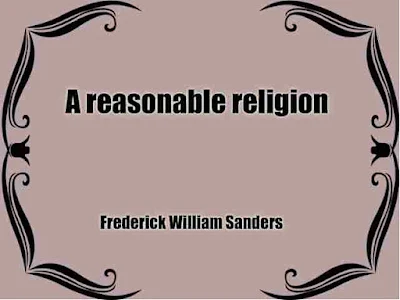A reasonable religion
Introduction by G. Stanley Hall
This he was able to do with a candor unalloyed by all prudential considerations as to how utter frankness, so often dangerous to men in his vocation, would affect his future career. Since his partial convalescence, he has decided, upon the advice and wish of his friends, wisely and well, as I, and I believe all his readers will think, to make public these meditations, in the modest hope that they will interest and benefit others who are inclined to face seriously the problems of life, mind, and destiny. In the first essay, the argument succinctly stated is that right thinking is necessary to right living, and that, as the ethical idea is the only working hypothesis for the right conduct of life, this latter must be based upon a consideration of all the facts that enter into it.
The next world must not dominate this, and there must be no "double housekeeping. " Perhaps the writer would not approve the slogan, "One world at a time, gentlemen, and this one now;" but no real good here must be sacrificed or even imperilled by the hypothesis of immortality, nor must specialization or absorption in business dwarf the sum-total of human nature born in each of us. Making the very most and best of this life and this world, magnifying the here and the now, doing the present duty, is the best way to attain the chief end of man, here or hereafter. In the second essay he urges that, as this is a universe, in which every atom is a part of a stupendous whole, it takes everything to explain anything, amplifying the moral of the "flower in the crannied wall."
The least event not only has innumerable determinants but affects the whole, which alone can be the complete cause of the tiniest part or event. The ethical implication is obvious. Not only the life of each individual but his every serious deed affects in some degree the world itself. Probably the author would not say with Rowland Hazard that the ego is a creative first cause, but rather that it is itself a plexus of links in an endless chain, as much caused as causing. His view, at any rate, is not inaccordant with Spinoza's idea sub specie eternities.
In the next essay, we are taught that moral evil is the result of human incapacity. This makes a man selfish and un- and anti-social. Real knowledge ripened into wisdom is the only cure of both physical and moral ills, and sound education is the greatest of all healers. In this chapter, the author anticipates some of the best precepts and practices of Du Bois and Marcinowski, the first of whom use careful, coherent thinking as a cure for the subtle brain, and even nerve, troubles, and the latter of whom prescribes philosophies somewhat as physicians do regimens.
Lastly, as to the relations between happiness and virtue, we are taught that the joys of sense can contribute very little to happiness. Egoism is good, but only so far as it is intelligent. The power to enjoy grows directly as does capacity for sympathy. Even non-moral pleasures may be made means to moral enjoyment. To be true to our own selves brings a joy that abides, for the welfare of society is only the sum of that of the individuals composing it.
Contents
Introduction.--A recovery wherein the following essays are conceived.--Philosophy and everyday life.--The nature of explanation and the true interpretation of the principle of cause and effect.--The the problem of evil.--Happiness and morality
the book details :
Download 7.2 MB


